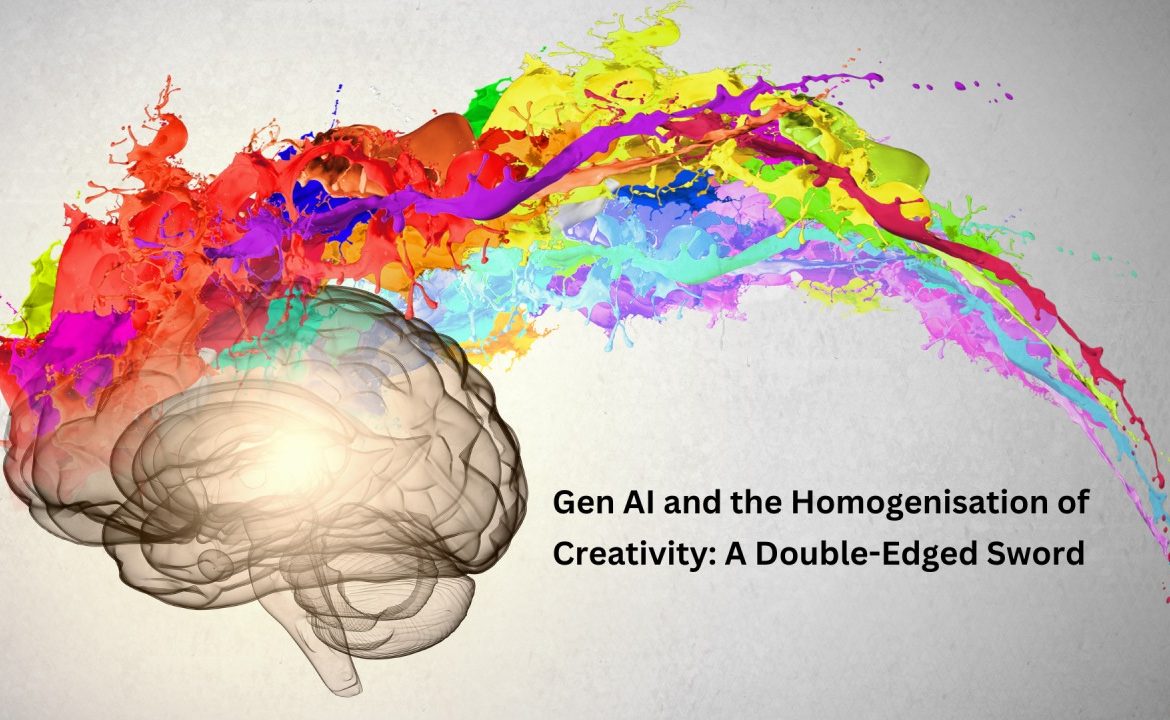Gen AI and the Homogenisation of Creativity: A Double-Edged Sword
The advent of Generative Artificial Intelligence (Gen AI) has revolutionized numerous fields, from art and music to writing and design, promising unprecedented efficiency and accessibility.
Proponents of AI-driven creativity argue that it democratizes the creative process, empowering individuals with limited artistic skills to produce sophisticated outputs. This democratization has led to a proliferation of content, making it easier than ever to find inspiration and share one’s work.
Pros of Gen AI in Creativity
- Accessibility and Democratization: One of the most significant advantages of Gen AI is the democratization of creativity. AI tools like OpenAI’s DALL-E and ChatGPT are accessible to anyone with an internet connection, allowing people without formal training or resources to create art, music, literature, and more. For example, amateur artists can use DALL-E to generate intricate artworks, and writers can use ChatGPT to draft compelling stories. This opens up creative fields to a broader audience, fostering inclusivity and diversity.
- Enhanced Productivity: Gen AI can handle repetitive and time-consuming tasks, freeing up human creators to focus on more complex and nuanced aspects of their work. For instance, an AI music composition tool can generate background music for videos, significantly speeding up the creative process for filmmakers and content creators.
- Augmentation of Human Creativity: Rather than replacing human creativity, Gen AI can augment it. AI tools can provide new ideas, perspectives, and variations that creators might not have considered. For instance, The Next Rembrandt project used AI to analyze Rembrandt’s works and create a new painting in his style, demonstrating how AI can push the boundaries of what is creatively possible.
- Cost-Effective Solutions: For businesses and individuals, using AI to generate content can be more cost-effective than hiring skilled professionals for every task. Small businesses can use AI-driven design tools like Canva to create professional-looking marketing materials without the need for a full-time designer.
However, this technological marvel is also casting a long shadow over the landscape of creativity, raising concerns about a looming homogenisation of ideas and fueling a troubling trend: the convergence of creative outputs toward a common aesthetic and style.
Cons of Gen AI in Creativity
- Homogenisation of Content: A notable downside is the homogenisation of creative content. As AI models are trained on vast datasets of existing works, they tend to reproduce patterns and styles prevalent in those datasets. This can lead to a proliferation of similar, derivative works. For example, AI-generated stock photos often look strikingly similar, reducing the diversity and originality that are hallmarks of true creativity.
- Loss of Human Touch: Creativity is often deeply personal, reflecting individual experiences, emotions, and perspectives. AI-generated content, while impressive, lacks the human touch that infuses art with soul and authenticity. This absence can result in work that feels impersonal or sterile. As musician Brian Eno puts it, “What makes music interesting is the interaction between people. Machines don’t have that.”
- Ethical and Copyright Concerns: The use of AI in creativity raises significant ethical and copyright issues. AI systems often generate content based on existing works, which can lead to plagiarism and intellectual property disputes. Additionally, the potential for misuse of AI-generated content for malicious purposes, such as deepfakes, poses a serious ethical dilemma.
- Dependence on Technology: Overreliance on AI tools can stifle individual creativity and problem-solving skills. If creators become too dependent on AI, they may lose the ability to think independently and develop their unique styles. As the writer Jaron Lanier warns, “If you have a system that’s pre-automated and pre-selected, it can undermine originality and critical thinking.”
Risk of Homogenisation
Consider the music industry. AI-powered tools can analyze popular songs and generate tracks that mimic their style and structure. While this can be a useful tool for aspiring musicians, it also risks creating a glut of formulaic pop songs that lack distinctive character. Similarly, in the visual arts, AI-generated images often exhibit a similar visual language, relying on familiar composition and color palettes. This homogenisation is not merely an aesthetic issue. It also has implications for cultural diversity and innovation. When creativity is channelled into a narrow range of styles and ideas, it stifles the development of new perspectives and approaches. As the media theorist Marshall McLuhan famously observed, “The medium is the message.” In the age of AI, the medium is increasingly shaping the message, leading to a loss of cultural richness. While the risks of homogenisation are real, it’s essential to view AI as a tool rather than a replacement for human creativity. By understanding its limitations and biases, we can harness its potential without compromising originality.
Balancing the Scales
The homogenisation of creativity brought about by Gen AI is a double-edged sword. While it democratizes creative fields, enhances productivity, and augments human creativity, it also risks homogenising content, losing the human touch, raising ethical concerns, and fostering dependence on technology. To strike a balance, it is crucial to use AI as a tool for inspiration and assistance rather than a crutch. AI can actually enhance human creativity by providing new stimuli and perspectives. But human creators must remain at the forefront, using their unique perspectives and emotional depth to infuse originality into their work. In the words of author and futurist Arthur C. Clarke, “Any sufficiently advanced technology is indistinguishable from magic.” The magic of Gen AI lies in its potential to amplify human creativity, but the true enchantment will always come from the human heart and mind.
#askKashyap #startup #accelerator #genAI #syncoro #brahmveda #unisyncangels

